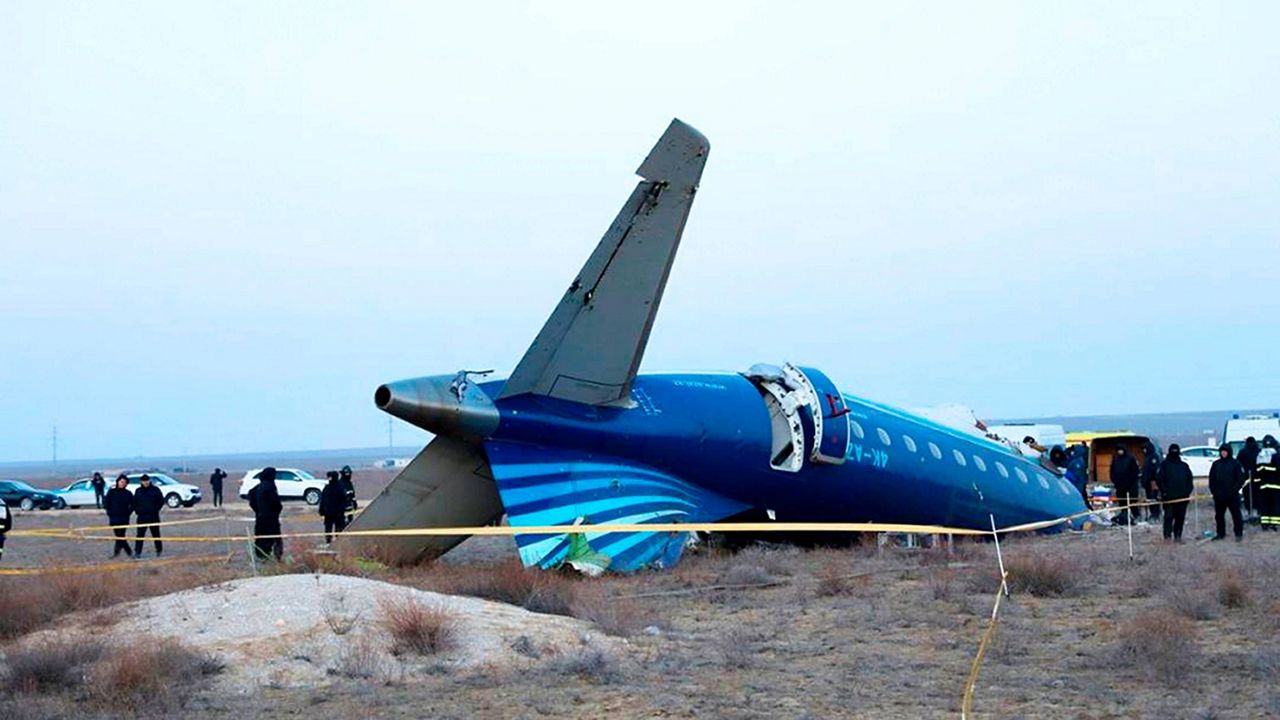BAKU, Azerbaijan — Russian air defense systems may have brought down an Azerbaijani airliner this week, a U.S. official said Friday after an Azerbaijani minister also suggested the plane was hit by a weapon, citing expert analysis and survivor accounts.
What You Need To Know
- U.S. and Azerbaijani officials have said weapons fire may have brought down an Azerbaijani airliner that crashed on Wednesday, killing 38 people
- The statements from Rashad Nabiyev and White House national security spokesman John Kirby on Friday raised pressure on Russia
- Officials in Moscow have said a drone attack was underway in the region that the Azerbaijan Airlines flight was destined for but have not addressed statements from aviation experts who blamed the crash on Russian air defenses responding to a Ukrainian attack
- The plane was flying from Azerbaijan's capital of Baku to Chechnya on Wednesday when it crashed, killing 38 people and leaving all 29 survivors injured
Friday's assessments by Rashan Nabiyev and White House national security spokesman John Kirby echoed those made by outside aviation experts who blamed the crash on Russian air defense systems responding to a Ukrainian attack. These statements raised pressure on Russia, where officials said a drone attack was underway in the region where the Azerbaijan Airlines flight was heading for a landing. They did not address statements blaming air defenses.
Kirby told reporters on Friday that the U.S. "have seen some early indications that would certainly point to the possibility that this jet was brought down by Russian air defense systems," but refused to elaborate, citing an ongoing investigation.
Pressed on whether the U.S. has intelligence that helped lead to that conclusion, or was simply relying on informed speculation from experts based on visual assessments of the crash, Kirby characterized the short answer as "yes" but said he'd "leave it at that," without providing further details.
The plane was flying from Azerbaijan's capital of Baku to Grozny, the regional capital of the Russian republic of Chechnya, on Wednesday when it turned toward Kazakhstan and crashed while making an attempt to land. The crash killed 38 people and left all 29 survivors injured.
Nabiyev, Azerbaijan's minister of digital development and transportation, told Azerbaijani media that "preliminary conclusions by experts point at external impact," as does witness testimony.
"The type of weapon used in the impact will be determined during the probe," Nabiyev said.
Passengers and crew who survived the crash told Azerbaijani media that they heard loud noises on the aircraft as it was circling over Grozny.
Flight attendant Aydan Rahimli said that after one noise, the oxygen masks automatically released. She said that she went to perform first aid on a colleague, Zulfugar Asadov, and then they heard another bang.
Asadov said that the noises sounded like something hitting the plane from outside. Shortly afterwards, he sustained a sudden injury like a "deep wound, the arm was lacerated as if someone hit me in the arm with an ax," he added. He denied a claim from Kazakh officials that an oxygen canister exploded inside the plane.
Another survivor, Jerova Salihat, told Azerbaijani television in an interview in the hospital that "something exploded" near her leg.
Dmitry Yadrov, head of Russia's civil aviation authority Rosaviatsia, said Friday that as the plane was preparing to land in Grozny in deep fog, Ukrainian drones were targeting the city, prompting authorities to close the area to air traffic.
Yadrov said that after the captain made two unsuccessful attempts to land, he was offered other airports but decided to fly to Aktau in Kazakhstan, across the Caspian Sea.
He didn't comment on statements from some aviation experts, who pointed out that holes seen in the plane's tail section suggested that it could have come under fire from Russian air defense systems.
Ukrainian drones have previously attacked Grozny and other areas in the Russian North Caucasus.
Azerbaijan Airlines blamed the crash on unspecified "physical and technical interference" and announced the suspension of flights to several Russian airports. It didn't say where the interference came from or provide any further details.
Kremlin spokesman Dmitry Peskov declined to comment on the claims that the plane was hit by Russian air defenses, saying that it will be up to investigators to determine the cause of the crash.
"The air incident is being investigated, and we don't believe we have the right to make any assessments until the conclusions are made as a result of the investigation," Peskov said in a conference call with reporters.
If it's proven that the plane crashed after being hit by Russian air defenses, it would be the second deadly civil aviation accident linked to fighting in Ukraine. Malaysia Airlines Flight 17 was downed with a Russian surface-to-air missile, killing all 298 people aboard, as it flew over the area in eastern Ukraine controlled by Moscow-backed separatists in 2014.
Russia has denied responsibility, but a Dutch court in 2022 convicted two Russians and a pro-Russia Ukrainian man for their role in downing the plane with an air defense system brought into Ukraine from a Russian military base.



